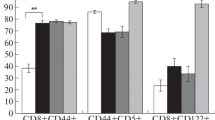Summary
In vitro cultivation of memory immune cells from P815- or P388-immune mice with corresponding irradiated tumor cells induced generation of cytolytic T cells (CTL). The induction of CTL generation, as well as the cytolytic activity itself, was tumor-specific. The in vitro generation of CTL from P815- or P388-immune cells was suppressed by spleen cells from mice bearing corresponding progressive tumors (tumor size 15 mm). The tumor-induced suppressor cells suppressed the in vitro generation of CTL, but did not affect their cytolytic function. The suppression was tumor-specific and was mediated by Ly1+2−L3T4+ T cells. Treatment of suppressor cell donors with cyclophosphamide or sublethal γ-radiation completely abolished the ability of their spleen cells to inhibit the in vitro CTL generation.
Similar content being viewed by others
References
Bear HD (1986) Tumor-specific suppressor T-cells inhibit the in vitro generation of cytolytic T cells from immune and early tumor-bearing host spleens. Cancer Res 46:1805
Berendt MJ, North RJ (1980) T cell-mediated suppression of antitumor immunity. An explanation for progressive growth of an immunogenic tumor. J Exp Med 151:69
Bonventre PF, Nikol AD, Ball EJ, Michael JG, Babel HC (1982) Development of protective immunity against bacterial and viral infections in tumor bearing mice coincident with suppression of tumor immunity. J Reticuloendothel Soc 32:25
Bursuker I, North RJ (1985) Suppression of generation of concomitant antitumor immunity by passively transferred suppressor T cells from tumor-bearing donors. Cancer Immunol Immunother 19:215
Dialynas DP, Wilde DB, Marrack M, Pierres A, Wall KA, Havran W, Otten G, Pierres M, Kappler J, Fitch FW (1983) Characterization of the murine antigenic determinant, designated L3T4a, recognized by monoclonal antibody GK1.5: Expression of L3T4a by functional T cell clones appears to correlate with class II MHC antigen-reactivity. Immunol Rev 74:29
Ledbetter JA, Herzenberg LA (1979) Xenogeneic monoclonal antibodies to mouse lymphoid differentiation antigens. Immunol Rev 47:63
Mark C, Figueroa F, Nagy ZA, Klein J (1982) Cytotoxic monoclonal antibody specific for Lyt-1.2 antigen. Immunogenetics 16:95
Mills CD, North RJ (1983) Expression of passively transferred immunity against an established tumor depends on generation of cytolytic T cells in recipient: Inhibition by suppressor T cells. J Exp Med 157:1448
North RJ (1986) Down-regulation of the antitumor immune response. Adv Cancer Res 45:1
North RJ (1986) Radiation-induced immunologically-mediated regression of an established tumor as an example of successful therapeutic immunomanipulation. J Exp Med 164:1652
North RJ, Bursuker I (1984) Generation and decay of the immune response to a progressive fibrosarcoma. I. Ly1+2− suppressor T cells down-regulate the generation of Ly1−2+ effector T cells. J Exp Med 159:1295
North RJ, Dye ES (1985) Ly1+2− suppressor T cells down-regulate the generation of Ly1−2+ effector T cells during progressive growth of the P815 mastocytoma. Immunology 54:47
North RJ, Dye ES, Mills CD (1982) T cell-mediated negative regulation of concomitant antitumor immunity as an obstacle to adoptive immunotherapy of established tumors. In: Fifer F, Goldstein AL (eds) The potential role of T cell populations in cancer therapy. Raven Press, New York, p 65
Raulet DH, Gottlieb PD, Bevan MJ (1980) Fractionation of lymphocyte populations with monoclonal antibodies specific for Lyt2.2 and Lyt3.1. J Immunol 125:1136
Schatten S, Granstein RD, Drebin JA, Green MI (1984) Suppressor T cells and the immune response to tumors. CRC Crit Rev Immunol 4:335
Takei F, Levy JG, Kilburn JG (1976) In vitro induction of cytotoxicity against syngeneic mastocytoma and its suppression by spleen and thymus cells from tumor-bearing mice. J Immunol 116:288
Takei F, Levy JG, Kilburn DG (1976) Characterization of suppressor cells in mice bearing syngeneic mastocytoma. J Immunol 118:412
Author information
Authors and Affiliations
Rights and permissions
About this article
Cite this article
Kaymakcalan, Z., Spitalny, G.L. & Bursuker, I. In vitro expression of secondary antitumor immunity by in vivo tumor-sensitized T cells: Inhibition by tumor-induced suppressor T cells. Cancer Immunol Immunother 25, 69–74 (1987). https://doi.org/10.1007/BF00199943
Received:
Accepted:
Issue Date:
DOI: https://doi.org/10.1007/BF00199943




